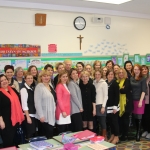News
On January 29-30th a seminar for the Lithuanian Heritage Schools' teachers was held in Boston. Seminar speakers, Vilnius University (ALTE- the Association of Language Testers in Europe member) linguistics department specialists, Joana Pribusauskaite and Rita Migauskiene, taught teachers how to test schools' students' proficiency levels using newly created tests.
Such seminar is a big step in a long process trying to accomplish that Lithuanian language taught at the Lithuanian heritage schools in the US would be valued at the same level as other heritage languages worldwide.
For many years project's initiators Neila Baumiliene and Gailute Narkeviciene have been raising this issue at various institutions in Lithuania, searching for specialists who would show interest in testing Lithuanian heritage schools' students in the US.
According to CERF (Common European Framework of Reference for Languages: Learning, Teaching, Assessment), there are six proficiency levels A1-A2-B1-B2-C1-C2.
Future educators at Lithuanian Universities are not taught to teach Lithuanian language as foreign language. There is no research done about children learning Lithuanian as a foreign language. Such students, attending Lithuanian heritage schools one day a week, can't accomplish the same results as their peers in Lithuania. Tests, made for students in Lithuania shouldn't be used for kids learning the language outside of the country.
Many languages have their proficiency diplomas recognized globally. Lithuanian language is a part of the European language group and is expected to meet the same standards. Language proficiency levels test puts language at the international level. It's not enough to be proud of having the oldest language. If family invests time, money, efforts, and their children spent over 1000 academic hours over 8 years, they should have a formal evaluation and recognition. No one questions the point of testing mathematics, history, english language knowledge. While testing language proficiency levels, we evaluate not just the students but the entire teaching program and methodology as well. Test is just a part of a whole system, including the program, teaching materials, certificates and teachers' continuous education as well.
Kazickas Family Foundation is a sole sponsor of this seminar. Gailute Narkeviciene, director of Boston Lithuanian School, organized the event. KFF also supports Lithuanian heritage schools E-center, the database that consists of curriculum materials, administrative and legal advice, paperwork, links for teacher continuous education resources, homeschooling materials and much more. For the fourth year in a row, foundation also supports Lithuanian heritage schools in the US, US Lithuanian Educational Council, designing trial Lithuanian language tests A1-A2-B1-B2 and various teachers' conferences. In 2015 foundation also supported first experimental B1 level testing of 21 Lithuanian heritage students from 5 states that took place in New York SLA.
Kazickas Family Foundation expects much appreciated co-operation and contribution from the Ministry of Education and Science of the Republic of Lithuania, Vilnius Univerity (ALTE - the Association of Language Testers in Europe member) and World Lithuanian Community's Education Commission.





